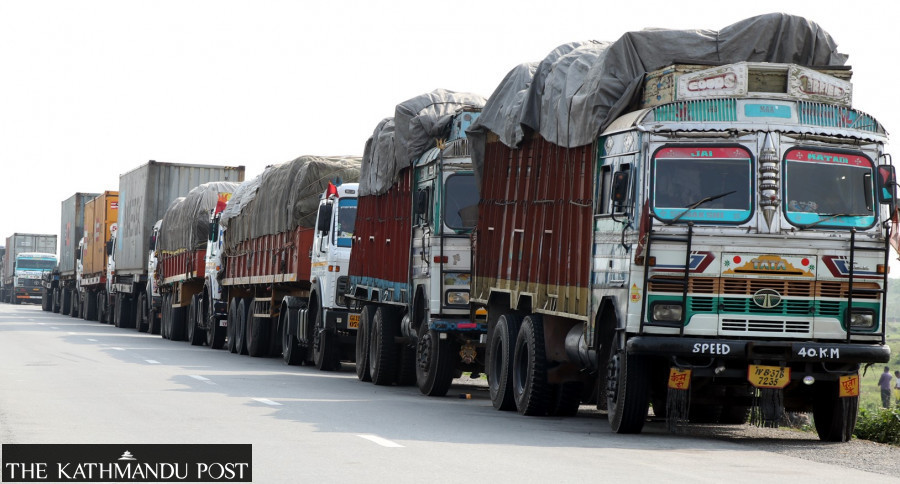Money
Nepal’s export of high-value products rises 18 percent
Export earnings from goods identified by the Nepal Trade Integration Strategy-2023 total Rs26 billion in the first quarter of the current fiscal year.
Krishana Prasain
Nepal’s export of high-value products increased by 18 percent in the first quarter of the current fiscal year, largely due to a rise in the shipment of iron and steel products, cardamom, dog chew, ginger, cement and lentils.
Export earnings from goods identified by the Nepal Trade Integration Strategy (NTIS) 2023 totalled Rs26 billion in the review period.
Nepal reviewed the NTIS basket in the current fiscal year, adding 20 products and services to the list.
In the first quarter of the last fiscal year, the export of products listed in the NTIS amounted to Rs22 billion.
With the addition of the new products and services, the export revenue grew by Rs3.99 billion, according to the statistics of the Trade and Export Promotion Centre, the national trade promotional body.
Experts, however, said there is nothing to be happy about.
“The new list added to the NTIS 2023 was already performing well. There is nothing to be happy about,” said Purushottam Ojha, former commerce secretary.
For instance, exports of iron and steel have been on a rising trend for many years, Ojha said.
The export of iron and steel jumped 102.7 percent to Rs4.61 billion in the first three months of the current fiscal year.
Shahil Agrawal, president of the Nepal Steel Rolling Mills Association, attributed the robust growth of iron and steel exports to government subsidies. The government provided a cash subsidy of 8 percent of the total export amount through the current fiscal year’s budget.
Jagdamba Steels exported iron and steel worth Rs2 billion in the last fiscal year. “We have already crossed last year’s mark in the first quarter,” said Agrawal, chairman of Jagdamba Group, the manufacturer of Jagdamba Steels in Nepal. “We have targeted to export iron and steel worth Rs8 billion this fiscal year.”
In total, insiders say that Nepal may export iron and steel worth Rs20 billion this fiscal year.
India is the major market for Nepali iron and steel.
Agrawal said it’s difficult to compete with established Indian brands like TATA and Jindal. “But, we are working to boost our brand in the Indian market, which, however, may take some time,” he said.
Nepal’s cement export totalled Rs384 million in the first quarter, up from Rs13.54 million in the same period last fiscal year.
Dhruba Raj Thapa, president of the Cement Manufacturers Association of Nepal, said that exports would have risen more had the government paid the export incentives promised to the manufacturers on time.
He said that more than half a dozen cement factories that have applied for the Indian Standard (IS) mark in the Bureau of Indian Standards have not received a response.
“This issue needs to be resolved through diplomatic talks as it is hurting the cement export,” he said.
According to Thapa, Nepal can export cement worth Rs160 billion annually.
Ojha said that when the government does not give export incentives on time, it disincentivises the industry.
Nepal started exporting cement to India officially last July, beginning with two manufacturers—Palpa Cement and Arghakhanchi Cement.
Shipments of readymade garments increased 13 percent to Rs2.69 billion in the first three months of the current fiscal year.
The domestic readymade garment manufacturers said that the high cost of production is making it challenging for Nepali exports to compete in the international market.
Export of large cardamom increased by 56.8 percent to Rs1.89 billion in the review period.
The export of dog chew increased by 36.7 percent to Rs761.1 million in the first three months of the current fiscal year.
The major buyers of dog chew are the US, Canada, the UK, Japan and Hong Kong.
Dog chew is mainly produced in Taplejung, Ilam and Panchthar.
The shipments of medicinal herbs increased by 59.5 percent to Rs707.88 million.
Nepal's ginger export increased by 159.5 percent to Rs397.46 million during the review period.
The export of vegetables, the newly added product to the NTIS list, increased by 105.23 percent to Rs396.89 million in the review period.
Export of Nepal's honey also increased to Rs16.761 million in the review period, from Rs5.96 million in the same period last fiscal year.
The export of drinking water increased to Rs1.40 million. It was Rs13,000 in the same period last fiscal year.
Similarly, the export of footwear increased by 1.5 percent to Rs239.78 million in the first quarter.
However, the export of woollen carpets, jute and jute products, woollen felt products, tea, wool and pashmina shawls, rosin and resin acid, Nepali handmade paper, gold and silver jewellery, pasta, coffee and leather declined.
The export of woollen carpets decreased by 4.5 percent to Rs2.93 billion in the review period.
The export of jute and jute products fell by 13.2 percent to Rs1.83 billion.
Jute farmers said that the price of jute last year was Rs11,000 per quintal. This year, the price has dropped to Rs9,000 per quintal.
The export of woollen felt products decreased by 5.8 percent to Rs1.62 billion.
Tea export declined by 1.9 percent to Rs1.29 billion in the review period.
Pasta, a newly included item in the NTIS 2023 list, declined by 10.53 percent to Rs472.42 million during the review period.
Similarly, the export of Nepali handmade paper decreased by 10.8 percent to Rs366 million in the first three months of the current fiscal year.
The export of rosin and resin acid decreased by 35.3 percent to Rs246.44 million.
The export of silver jewellery decreased by 29.8 percent to Rs48.24 million. Shipment of leather declined by 21.80 percent to Rs83.17 million during the review period.




 9.7°C Kathmandu
9.7°C Kathmandu















